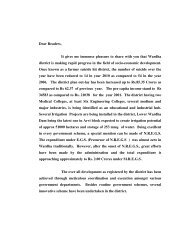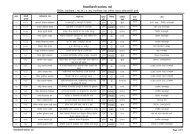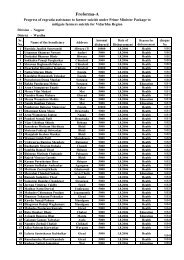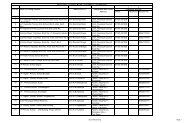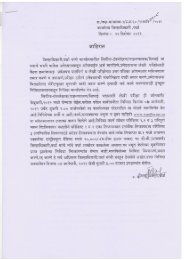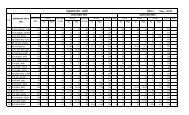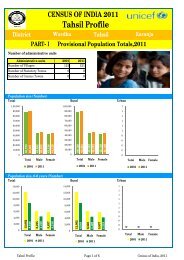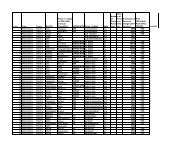You also want an ePaper? Increase the reach of your titles
YUMPU automatically turns print PDFs into web optimized ePapers that Google loves.
<strong>Annexure</strong> - C<br />
Evacuation<br />
Evacuations are more common than many people realize. Hundreds of times each<br />
year, transportation and industrial accidents release harmful substances, forcing thousands<br />
of people to leave their homes. Fires and floods cause evacuations even more frequently.<br />
When community evacuations become necessary, local officials provide<br />
information to the public through the media. The relief organizations provide emergency<br />
shelter and supplies. To be prepared for an emergency, you should have enough water,<br />
food, clothing and emergency supplies to last at least three days. In a catastrophic<br />
emergency, you might need to be self-sufficient for even longer.<br />
The amount of time you have to evacuate will depend on the disaster. If the event<br />
can be monitored, such as a severe winter storm, you might have time to<br />
prepare. However, many disasters allow no time for people to gather even the most basic<br />
necessities. This is why you should prepare now.<br />
Planning for evacuation<br />
� Be knowledgeable of designated emergency routes. If you do not own a vehicle/car,<br />
make transportation arrangements with friends or your local government.<br />
� Talk with your household about the possibility of evacuation. Plan where you<br />
would go if you had to leave your home. Determine how you would get there.<br />
� Plan a place to meet your household in case you are separated from one another in a<br />
disaster. Ask a friend outside your town to be the "checkpoint" so that everyone in<br />
the household can call that person to say they are safe.<br />
� Find out where children will be sent if schools are evacuated.<br />
� Assemble a disaster supplies kit. Include a battery-powered radio, flashlight, extra<br />
batteries, food, water and clothing.<br />
� Keep fuel in your car/vehicles if an evacuation seems likely. Petrol/Gas stations<br />
may be closed during emergencies and unable to pump petrol/gas during power<br />
outages.<br />
� Know how to shut off your home's electricity, gas and water supplies at main<br />
switches and valves. Have the tools you would need to do this (usually adjustable<br />
pipe and crescent wrenches).<br />
63



